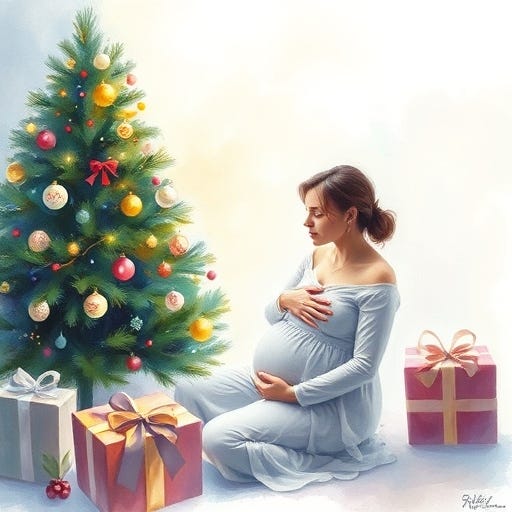Navigating Christmas While Pregnant After Loss: Balancing Grief and Hope
A therapist's guide to embracing the festive season with compassion, remembrance, and self-care during pregnancy after loss.
How to Navigate Christmas While Pregnant After Loss
Last week in my therapy room, Sarah1 sat quietly, her hands resting on her growing bump, tears rolling down her cheeks as she described decorating her Christmas tree. "I should be watching my baby crawl towards the ornaments", she whispered, "instead, I'm pregnant again and terrified of putting up tiny socks in next year's stocking". Another client, Emma, shared how she found herself frozen in the Christmas card aisle, overwhelmed by the sight of 'Baby's First Christmas' cards – the same ones she had bought with such hope last year, before her loss at 16 weeks. These stories echo through my therapy room as December approaches, each one a testament to the complex journey of pregnancy after loss (PAL) during the festive season.
As a therapist specialising in PAL, I’ve seen how the holiday season magnifies emotions, intertwining grief with joy. Research supports this, showing that significant life events such as Christmas can amplify distress for individuals experiencing perinatal grief, particularly for those navigating a subsequent pregnancy (Côté-Arsenault & Donato, 2011).
The Bittersweet Symphony of PAL During the Festive Season
When Joy Meets Grief
The holiday season often heightens emotional experiences, creating what researchers call a "dual process of grieving and bonding" in PAL (Armstrong, 2006). This duality emerges because the brain simultaneously processes the grief of the previous loss and the cautious hope of the current pregnancy (Côté-Arsenault & Donato, 2011).
For example, you may find yourself caught between moments of profound sadness and fleeting joy. One moment, the twinkling lights on the tree bring memories of your loss; the next, your baby’s gentle movements remind you of the hope growing within. This emotional tension is natural and reflective of the deep love you carry for both your lost baby and your current pregnancy.
The Shadow of Time
Time can feel both healing and cruel during the holiday season. Many individuals find themselves fixated on milestones their lost baby would have reached, such as crawling under the tree or celebrating a first Christmas. These thoughts, referred to as anniversary reactions, are heightened emotional responses triggered by significant dates (Armstrong, 2006).
Research highlights that parents in PAL often revisit and reinterpret their grief during such anniversaries, which is a way of maintaining an ongoing connection with the baby they lost (Côté-Arsenault & Donato, 2011). Far from being a sign of "stuckness," these thoughts reflect the enduring love and bond you have with your baby.
Sweet Moments in the Present
Yet amidst these challenging emotions, there's also the sweetness of your current pregnancy. You might catch yourself absent-mindedly rubbing your growing bump while watching Christmas movies, or feeling a flutter of movement as you wrap presents. These moments are precious and valid, even when they're accompanied by worry or guilt.
Allowing ourselves to experience joy in pregnancy after loss doesn't diminish our love for the baby we lost. Instead, it creates "emotional expansion" – our heart's capacity to hold both past and present love simultaneously.
Navigating the Emotional Rollercoaster
The Power of Validation
First, know this: every emotion you feel is valid. The moments of joy, the waves of sadness, and the fear that often accompanies happiness are all part of your journey. Studies indicate that acknowledging and validating emotions enhances resilience in individuals navigating PAL (Côté-Arsenault & Freije, 2004).
Think of your emotions as Christmas lights—each unique, each valid, and all part of a beautiful display reflecting your journey.
Remembrance Rituals
Creating space to remember your lost baby during the holiday season can be both healing and honouring. Consider:
Hanging a special ornament on your tree
Writing a Christmas card to your baby
Creating a memory corner with a candle and meaningful items
Making a donation to a pregnancy loss charity in their name
These rituals aren't about dwelling in grief; they're about acknowledging that love continues beyond loss. Research suggests that creating rituals helps individuals process grief and maintain a bond with the baby they lost (Armstrong, 2006).
Permission to Feel
Your emotional experience might look different from others', and that's okay. Some days might bring unexpected joy, others might feel heavy with grief. Consider keeping a journal with prompts like:
"Today, I'm grateful for..."
"I'm finding it difficult when..."
"I wish people knew..."
"My baby (lost and current) is teaching me..."
These exercises promote self-compassion and emotional regulation, which are essential in navigating the complexities of PAL (Hutti, Armstrong & Myers, 2015).
Building Your Support Circle
The holiday season often brings increased social interactions, which can feel overwhelming during PAL. Research indicates that having even one or two understanding confidants significantly improves emotional wellbeing during this journey (Côté-Arsenault & Freije, 2004).
Choose your support system carefully – those who can hold space for both your grief and your hope, who don't try to fix but simply understand. Sometimes, this might mean setting boundaries with well-meaning relatives who don't quite understand your experience.
Mindful Self-Care
Self-care during PAL isn't just about bubble baths (though they're lovely if they help). It's about honouring your needs moment by moment. This might mean:
Saying no to overwhelming social events
Taking quiet moments to connect with your current pregnancy
Allowing yourself to rest when emotions feel heavy
Moving your body gently when it feels right
Seeking professional support if needed
A Gentle Reminder
As we approach this festive season, remember that you're carrying not just a new life, but also a profound love story – one that includes both loss and hope. Your journey is unique, your feelings are valid, and you deserve all the support and understanding you need.
To those reading this while navigating their own PAL journey this Christmas:
I hold you in my thoughts. Your strength in carrying both grief and hope is profound, and you're not alone in this experience. May you find moments of peace amidst the complexity, and may you feel held by those who understand this delicate dance of loss and love.
Remember, your heart has the capacity to hold it all – the memories of the past, the hopes for the future, and the present moment exactly as it is.
References:
Armstrong, D. (2006). Perinatal loss and parental distress: Grieving and bonding in subsequent pregnancies. Journal of Perinatal & Neonatal Nursing, 20(4), pp. 334-343. doi:10.1891/0730-0832.20.4.334.
Côté-Arsenault, D. and Donato, K. (2011). Emotional cushioning in pregnancy after perinatal loss. Journal of Reproductive and Infant Psychology, 29(1), pp. 81–92. doi:10.1080/02646838.2010.513115.
Côté-Arsenault, D. and Freije, M. M. (2004). Stress in high-risk pregnancies following loss: The role of previous experiences and coping strategies. Journal of Perinatal and Neonatal Nursing, 18(4), pp. 279-289. doi:10.1097/00005237-200410000-00007.
Hutti, M. H., Armstrong, D. S., and Myers, J. A. (2015). Grief intensity, psychological well-being, and the intimate partner relationship in the subsequent pregnancy after a perinatal loss. Journal of Obstetric, Gynecologic & Neonatal Nursing, 44(1), pp. 42-50. doi:10.1111/1552-6909.12539.
All the names have been changed to preserve clients' anonymity.








